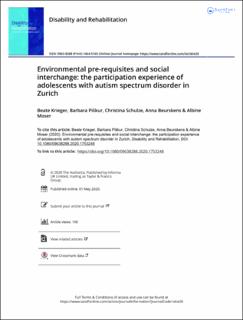Please use this identifier to cite or link to this item:
https://doi.org/10.21256/zhaw-20023Full metadata record
| DC Field | Value | Language |
|---|---|---|
| dc.contributor.author | Krieger, Beate | - |
| dc.contributor.author | Piškur, Barbara | - |
| dc.contributor.author | Schulze, Christina | - |
| dc.contributor.author | Beurskens, Anna | - |
| dc.contributor.author | Moser, Albine | - |
| dc.date.accessioned | 2020-05-14T13:53:12Z | - |
| dc.date.available | 2020-05-14T13:53:12Z | - |
| dc.date.issued | 2020-05-01 | - |
| dc.identifier.issn | 0963-8288 | de_CH |
| dc.identifier.issn | 1464-5165 | de_CH |
| dc.identifier.uri | https://digitalcollection.zhaw.ch/handle/11475/20023 | - |
| dc.description.abstract | Aim: Participation of adolescents with autism spectrum disorder hardly occurs in settings outside of home and school. Little is known about how their participation is influenced by environmental factors. This study explored how and why adolescents with autism spectrum disorder perceive aspects of their environment as facilitators or barriers to their participation outside of home and school. Method: This explanatory case study explored the participation experiences of adolescents with autism spectrum disorder (15-21 years) from Zurich and surroundings with in-depth interviews and photo-elicitation, using photos made by the participants during activities outside of home and school. Data was analysed with a 7-step procedure. Result: The presence of two main themes seemed necessary to facilitate participation outside of home and school: "environmental prerequisites to attend activities", which consists of five subthemes, such as "the company of trusted persons" and "the provision of knowledge and information", and "social interchange and engagement", which consists of three subthemes and describes how actual involvement can be supported. Conclusion: Our findings highlight the influence of trusted persons on adolescents with autism spectrum disorder, and the need to extend the support network for these adolescents to other individuals, services and society so that their participation in activities can be encouraged. IMPLICATIONS FOR REHABILITATION: Adolescents with autism spectrum disorder perceive every kind of participation outside of home and school as social. We recommend using the company of trusted persons to encourage adolescents with autism spectrum disorder to actively participate outside of home and school. Rehabilitation professionals should promote environment-based approaches to achieve participation of adolescents with autism spectrum disorder. Rehabilitation professionals should actively approach, acknowledge and gently guide adolescents with autism spectrum disorder to support engagement in participation. | de_CH |
| dc.language.iso | en | de_CH |
| dc.publisher | Taylor & Francis | de_CH |
| dc.relation.ispartof | Disability and Rehabilitation | de_CH |
| dc.rights | http://creativecommons.org/licenses/by-nc-nd/4.0/ | de_CH |
| dc.subject | Social environment | de_CH |
| dc.subject | Adolescent | de_CH |
| dc.subject | Case study | de_CH |
| dc.subject | Community participation | de_CH |
| dc.subject | Qualitative research | de_CH |
| dc.subject.ddc | 305: Personengruppen (Alter, Herkunft, Geschlecht, Einkommen) | de_CH |
| dc.subject.ddc | 616.8: Neurologie und Krankheiten des Nervensystems | de_CH |
| dc.title | Environmental pre-requisites and social interchange : the participation experience of adolescents with autism spectrum disorder in Zurich | de_CH |
| dc.type | Beitrag in wissenschaftlicher Zeitschrift | de_CH |
| dcterms.type | Text | de_CH |
| zhaw.departement | Gesundheit | de_CH |
| zhaw.organisationalunit | Institut für Ergotherapie (IER) | de_CH |
| dc.identifier.doi | 10.1080/09638288.2020.1753248 | de_CH |
| dc.identifier.doi | 10.21256/zhaw-20023 | - |
| dc.identifier.pmid | 32356476 | de_CH |
| zhaw.funding.eu | No | de_CH |
| zhaw.issue | 26 | de_CH |
| zhaw.originated.zhaw | Yes | de_CH |
| zhaw.pages.end | 3802 | de_CH |
| zhaw.pages.start | 3789 | de_CH |
| zhaw.publication.status | publishedVersion | de_CH |
| zhaw.volume | 43 | de_CH |
| zhaw.publication.review | Peer review (Publikation) | de_CH |
| zhaw.webfeed | Gesellschaftliche Integration | de_CH |
| zhaw.author.additional | No | de_CH |
| zhaw.display.portrait | Yes | de_CH |
| Appears in collections: | Publikationen Gesundheit | |
Files in This Item:
| File | Description | Size | Format | |
|---|---|---|---|---|
| 2020_Krieger_etal_Environmental-pre-requisites_Disability-and-Rehabilitation.pdf | 3.13 MB | Adobe PDF |  View/Open |
Show simple item record
Krieger, B., Piškur, B., Schulze, C., Beurskens, A., & Moser, A. (2020). Environmental pre-requisites and social interchange : the participation experience of adolescents with autism spectrum disorder in Zurich. Disability and Rehabilitation, 43(26), 3789–3802. https://doi.org/10.1080/09638288.2020.1753248
Krieger, B. et al. (2020) ‘Environmental pre-requisites and social interchange : the participation experience of adolescents with autism spectrum disorder in Zurich’, Disability and Rehabilitation, 43(26), pp. 3789–3802. Available at: https://doi.org/10.1080/09638288.2020.1753248.
B. Krieger, B. Piškur, C. Schulze, A. Beurskens, and A. Moser, “Environmental pre-requisites and social interchange : the participation experience of adolescents with autism spectrum disorder in Zurich,” Disability and Rehabilitation, vol. 43, no. 26, pp. 3789–3802, May 2020, doi: 10.1080/09638288.2020.1753248.
KRIEGER, Beate, Barbara PIŠKUR, Christina SCHULZE, Anna BEURSKENS und Albine MOSER, 2020. Environmental pre-requisites and social interchange : the participation experience of adolescents with autism spectrum disorder in Zurich. Disability and Rehabilitation. 1 Mai 2020. Bd. 43, Nr. 26, S. 3789–3802. DOI 10.1080/09638288.2020.1753248
Krieger, Beate, Barbara Piškur, Christina Schulze, Anna Beurskens, and Albine Moser. 2020. “Environmental Pre-Requisites and Social Interchange : The Participation Experience of Adolescents with Autism Spectrum Disorder in Zurich.” Disability and Rehabilitation 43 (26): 3789–3802. https://doi.org/10.1080/09638288.2020.1753248.
Krieger, Beate, et al. “Environmental Pre-Requisites and Social Interchange : The Participation Experience of Adolescents with Autism Spectrum Disorder in Zurich.” Disability and Rehabilitation, vol. 43, no. 26, May 2020, pp. 3789–802, https://doi.org/10.1080/09638288.2020.1753248.
Items in DSpace are protected by copyright, with all rights reserved, unless otherwise indicated.